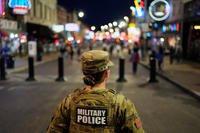The former top American commander in South Korea on Thursday said the Trump administration must be ready to launch a pre-emptive strike on North Korea before it tests a long-range missile capable of hitting the U.S. mainland.
"I don't think any talking, any diplomacy, is going to convince Kim Jong-un to change," retired Army Gen. Walter Sharp said of the North Korean leader in suggesting the possibility of a pre-emptive strike to eliminate the nuclear threat.
Should North Korea put a missile such as the three-stage Taepodong 2 on the launchpad, and the U.S. was unsure whether it carried a satellite or a nuclear warhead, the missile should be destroyed, said Sharp, the former commander of U..S. Forces-Korea and the United Nations Command from 2008 to 2011.
The U.S. also must be ready to respond with overwhelming force if North Korea retaliated, Sharp said. "If [Kim] responds back after we take one of these missiles out," he should know "that there is a lot more coming his way, something he will fear," Sharp said.
"I think we're to that point that we need to have that capability. I am to that point," he said, adding that the U.S. could not risk relying solely on anti-missile defenses to counter North Korean long-range missiles.
Sharp spoke at a panel discussion on challenges from North Korea at an all-day forum sponsored by the Center for Strategic and International Studies in Washington, D.C., on the national security issues that will confront President-elect Donald Trump.
Others on the panel, while sharing Sharp's concerns about the North Korean nuclear threat, worried about the aftermath of a pre-emptive strike. Despite North Korea's nuclear tests, "there is potential in diplomacy," said Christine Wormuth, the former undersecretary of defense for policy in the Obama administration.
"I'm concerned about pre-emptive action on the launchpad," Wormuth said. "What does Kim Jong-un do in response? I worry quite a bit about our ability to sort of manage a potential retaliation."
During the campaign, Trump called Kim Jong-un a "bad dude" and a "maniac," but also said he might be willing to meet with Kim over a hamburger to defuse tensions on the peninsula.
The panel discussion came a day after the U.N. Security Council imposed new sanctions on North Korea aimed at cutting its export revenues. The latest sanctions were in response to the country's fifth and largest underground nuclear weapons test, which occurred in September.
The 15-member council unanimously adopted a resolution to slash North Korea's exports of coal -- its main export item -- by about 60 percent and also imposed a ban on its export of copper, nickel, silver and zinc.
Samantha Power, the U.S. ambassador to the United Nations, said that the sanctions would cost North Korea about $800 million annually.
"No resolution in New York will likely, tomorrow, persuade Pyongyang to cease its relentless pursuit of nuclear weapons, but this resolution imposes unprecedented costs," she said.
In a statement, North Korea's Foreign Ministry said the sanctions would have no effect on the regime's pursuit of nuclear weapons and delivery systems.
"There will be no greater miscalculation than to think that Obama and his henchmen can use the cowardly sanctions racket to try to force us to give up our nuclear armament policy or undermine our nuclear power status," the statement said.









